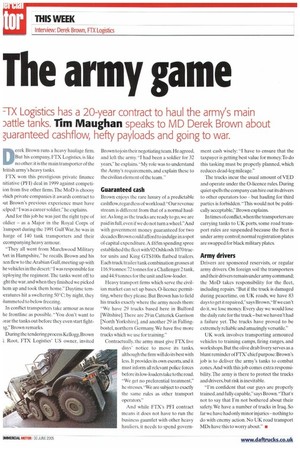The army game
Page 24

If you've noticed an error in this article please click here to report it so we can fix it.
=TX Logistics has a 20-year contract to haul the army's main Jade tanks. Tim Maughan speaks to MD Derek Brown about guaranteed cashflow, hefty payloads and going to war.
Derek Brown runs a heavy haulage firm. But his company, FTX Logistics, is like no other: it is the main transporter of the 3ritish army's heavy tanks.
FTX won this prestigious private finance nitiative (PFI) deal in 1999 against competiion from five other firms. The MoD is choosy vhich private companies it awards contract to lut Brown's previous experience must have ielped:"I was a career soldier," he explains.
And for this job he was just the right type of oldier as a Major in the Royal Corps of lansport during the 1991 Gulf War, he was in harge of 140 tank transporters and their ccornpanying heavy armour.
-They all went from Marchwood Military 'ort in Hampshire," he recalls. Brown and his nen flew to the Arabian Gulf, meeting up with he vehicles in the desert: "I was responsible for feploying the regiment. The tanks went off to ght the war, and when they finished we picked hem up and took them home." Daytime ternleratures hit a sweltering 50°C; by night, they ,Iummeted to below freezing.
In conflict transporters take armour as near he frontline as possible. "You don't want to /ear the tanks out before they even start fightig," Brown remarks.
During the tendering process Kellogg,Brown 'r. Root, FTX Logistics' US owner, invited Brown to join their negotiating team. He ageed, and left the army."! had been a soldier for 32 years," he explains, "My role was to understand the Army's requirements, and explain these to the civilian element of the team."
Guaranteed cash
Brown enjoys the rare luxury of a predictable cashflow, regardless of workload:" Our revenue stream is different from that of a normal haulier. As long as the trucks are ready to go, we are paid in full,even if we do not turn a wheel."And with government money guaranteed for two decades Brown could afford to indulge in a spot of capital expenditure. A £65m spending spree established the fleet with 92 Oshkosh 1070 tractor units and King GTS100s flatbed trailers. Each tnickitrailer/tank combination grosses at 116.9 tonnes: 72 tonnes for a Challenger 2 tank, and 44.9 tonnes for the unit and low-loader.
Heavy transport firms which serve the civilian market can set up bases, 0-licence permitting, where they please. But Brown has to field his trucks exactly where the army needs them: "We have 29 trucks based here in Bulford [Wiltshire]. There are 29 in Catterick Garrison [North Yorkshire], and another 29 in Fallinghostel, northern Germany. We have five more trucks which we use for training."
Contractually, the army must give FTX five days' notice to move its tanks, although the firm will do its best with less. It provides its own escorts, and it must inform all relevant police forces before its low-loaders take to the road. "We get no preferential treatment," he stresses. "We are subject to exactly the same rules as other transport operators."
And while FTX's PH contract means it does not have to run the business gauntlet with other heavy hauliers, it needs to spend govern ment cash wisely: have to ensure that the taxpayer is getting best value for money. To do this tasking must be properly planned, which reduces dead-leg mileage."
The trucks incur the usual amount of VED and operate under the 0-licence rules. During quiet spells the company can hire out its drivers to other operators too but hauling for third parties is forbidden. "This would not be politically acceptable," Brown explains.
In times of contlict,when the transporters are carrying tanks to UK ports, some road transport rules are suspended because the fleet is under army control; normal registration plates are swapped for black military plates.
Army drivers
Drivers are sponsored reservists, or regular army drivers. On foreign soil the transporters and their drivers remain under army command; the MoD takes responsibility for the fleet, including repairs. "But if the truck is damaged during peacetime. on UK roads, we have 83 days to get it repaired,"says Brown,"If we can't do it, we lose money. Every day we would lose the daily rate for the truck but we haven't had a failure yet. The trucks have proved to be extremely reliable and amazingly versatile."
UK work involves transporting armoured vehicles to training camps, firing ranges, and workshops. But the olive drab livery serves as a blunt reminder of FTX' chief purpose:Brown's job is to deliver the army's tanks to combat zones. And with this job comes extra responsibility. The army is there to protect the trucks and drivers, but risk is inevitable.
"I'm confident that our guys are properly trained and fully capable," says Brown. "That's not to say that I'm not bothered about their safety. We have a number of trucks in Iraq. So far we have had only minor injuries-nothing to do with enemy action. No UK road transport MDs have this to worry about." •


































































































































































































